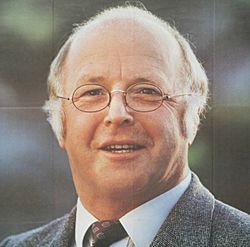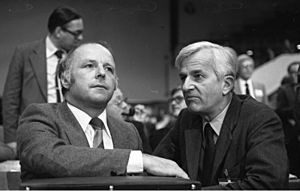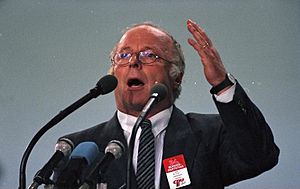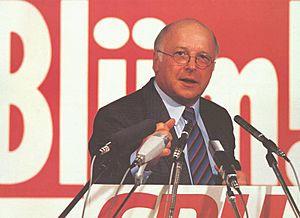Norbert Blüm facts for kids
Quick facts for kids
Norbert Blüm
|
|
|---|---|

Norbert Blüm in 1987
|
|
| Minister of Labour and Social Affairs | |
| In office 4 October 1982 – 27 October 1998 |
|
| Chancellor | Helmut Kohl |
| Preceded by | Heinz Westphal |
| Succeeded by | Walter Riester |
| Member of the Bundestag for Rhineland-Palatinate |
|
| In office 1972–1981 |
|
| Member of the Bundestag for North Rhine-Westphalia |
|
| In office 1983–2002 |
|
| Personal details | |
| Born | 21 July 1935 Rüsselsheim am Main, Hesse, Germany |
| Died | 23 April 2020 (aged 84) Bonn, North Rhine-Westphalia, Germany |
| Political party | CDU |
| Spouse |
Marita Blüm (née Binger)
(m. 1964) |
| Children | 3 |
| Education |
|
| Awards | Münchhausen Prize (2000) Leipzig Human Rights Award (2001) Leopold Kunschak Prize (2005) |

Norbert Blüm (born July 21, 1935 – died April 23, 2020) was an important German politician. He was a member of the German parliament, called the Bundestag. He also led the CDU party in North Rhine-Westphalia.
Blüm is best known for being the Minister of Labour and Social Affairs. He held this job for 16 years, which was the entire time Helmut Kohl was the Chancellor of Germany. He was a member of the Bundestag from 1972 to 1981 and again from 1983 to 2002. Blüm was part of the more socially-minded group within the conservative CDU party.
Contents
Early Life and Education
Norbert Blüm was born in Rüsselsheim am Main, Germany. He went to a local primary school, called a Volksschule. When he was 15, in 1950, he joined the CDU political party. In the same year, he also joined a large workers' union called IG Metall.
From 1949 to 1957, he trained and worked as a toolmaker for the car company Opel. He was active in the factory, helping young workers. He also helped start a local Boy Scouts group called the Deutsche Pfadfinderschaft Sankt Georg. In 1961, he finished high school at an evening school in Mainz. This allowed him to go to university.
He studied German language, history, philosophy, and theology at the University of Bonn and University of Cologne. One of his teachers was Joseph Ratzinger, who later became Pope. In 1967, he earned his PhD degree from the University of Bonn.
Political Career
From 1977 to 1987, Norbert Blüm was the leader of the Christian Democratic Employees' Association. This group represented workers within the CDU party. He was also a member of the CDU's main leadership committee for many years, from 1969 to 2000. From 1987 to 1999, he was the leader of the CDU party in the state of North Rhine-Westphalia.
Blüm was a member of the Bundestag (German parliament) for the CDU from 1972 to 1981. He then served again from 1983 to 2002. For a short time, from 1981 to 1982, he was a Senator in Berlin. He also served as the vice-chairman of the national CDU party from 1981 to 1990 and again from 1992 to 2000.
His most important role was as Federal Minister for Labour and Social Affairs from 1982 to 1998. In this job, he was in charge of making changes to Germany's pension system. His biggest success was creating the long-term care insurance in 1995. This insurance helps people who need long-term care, like the elderly or those with disabilities. The plan was discussed a lot in the Bundestag before it became law.
Important Beliefs and Actions
Norbert Blüm believed strongly in Christian values. He was part of the more social side of the CDU party, which is usually a centre-right party. He was greatly influenced by a religious philosopher named Oswald von Nell-Breuning. This philosopher taught Blüm about important ideas like "subsidiarity" (helping people locally), "solidarity" (supporting each other), and "charity" (helping those in need).
While he was a minister, Blüm strongly disagreed with other politicians who wanted to raise the retirement age from 65 to 70. He fought against this idea.
A famous quote from him is "Die Rente ist sicher," which means "Pensions are safe." He said this in 1986 to reassure people about their retirement money. This quote became very well-known in Germany and was often used in jokes or by his critics.
Blüm was a strong supporter of human rights. In 1987, he visited Chile and spoke out against the dictator Augusto Pinochet, accusing him of torture.
He once said that politics is a "struggle." He believed that if you want to make changes, you can't try to please everyone.
His main goals in politics were to achieve social justice and fight against unemployment. He cared a lot about "the little people" and worked to prevent society from becoming too divided between rich and poor. He worried that a later government plan, called the Agenda 2010, would harm social peace.
Blüm was also a strong critic of Scientology. Because of this, some Scientology supporters claimed that the organization was being unfairly treated in Germany.
Even though he had a good relationship with Chancellor Helmut Kohl, Blüm criticized how Kohl handled a scandal involving donations to the CDU party.
After he left the Bundestag in 2002, he continued to share his opinions on political issues. He sometimes criticized Israel's actions in the Middle East conflict. Some people accused him of being against Jewish people, but he always denied this.
In 2016, he spoke out against the CDU's policy on refugees. He felt that the discussions about refugees were too cold-hearted. During the refugee crisis, he visited a refugee camp in Greece called Idomeni in 2016. He strongly criticized how the European Union was treating refugees, saying it was "unworthy of European culture." To show his support, he even spent one night sleeping in the refugee camp.
In 2016, he also spoke against the idea of an unconditional basic income. This was an idea being discussed in Switzerland at the time. He thought it would be "unfair" and a way to avoid the government's responsibility to help people.
Later Life and Passing
Norbert Blüm married Marita Binger in 1964. They had three children: one son and two daughters. Blüm was a practicing Roman Catholic.
In 2019, Blüm suffered from a serious blood infection, called blood poisoning. This caused his arms and legs to become paralyzed. In March 2020, he wrote an article for a German newspaper called Die Zeit. In the article, he described his new life in a wheelchair. He said that the illness came into his life "like a thief in the night."
Norbert Blüm passed away in Bonn on April 23, 2020.
Other Activities
- Member of the Advisory Board for the Hans Böckler Prize of the City of Cologne
- Green Helmets, Member of the Board of Trustees (a charity organization)
- Bonn Minster, Member of the Board of Trustees (a church in Bonn)
- St. Maria zur Wiese, Member of the Board of Trustees (another church)
- IG Metall, Member (since 1949)
Awards
- 2000: Münchhausen Prize
- 2001: Leipzig Human Rights Award
- 2005: Leopold Kunschak Prize
See also
 In Spanish: Norbert Blüm para niños
In Spanish: Norbert Blüm para niños
 | DeHart Hubbard |
 | Wilma Rudolph |
 | Jesse Owens |
 | Jackie Joyner-Kersee |
 | Major Taylor |



